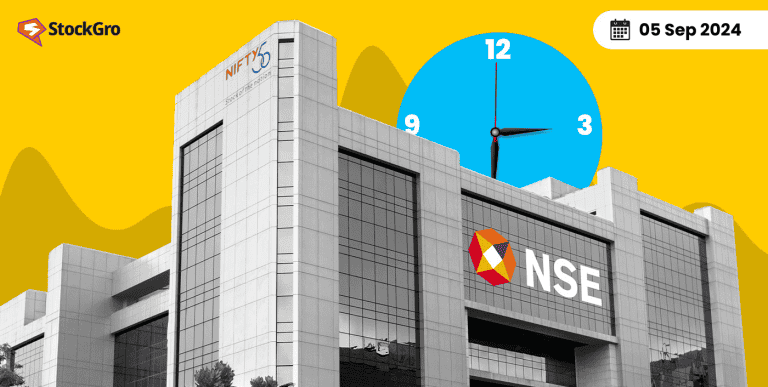
Understanding the intricacies of the stock market is a prerequisite for any investor. Presented here are 15 highly-rated trading books. These titles span various approaches, from timeless investing principles to advanced strategies. Explore this simple trading book list to deepen your understanding and refine your skills in the financial markets.
Also read: Teachers’ Day – Investing lessons from successful investors
#1 The Intelligent Investor-Benjamin Graham
This classic trading book for beginners offers a strategic guide to navigating the financial markets. Benjamin Graham advocates for a value-based approach, focusing on identifying assets priced below their true worth. He stresses the importance of margin of safety & taking a measured, analytical path.
The updated edition– with Jason Zweig’s commentary–bridges Graham’s timeless advice with today’s market realities. Whether you’re cautious or willing to take calculated risks, the book provides distinct strategies for different types of market participants. Graham’s wisdom remains essential for those aiming to build sustainable wealth.
#2 Secrets of a Pivot Boss- Franklin O. Ochoa
This book delves into advanced pivot-based methods, offering fresh perspectives on market navigation. It introduces concepts like the Money Zone and Camarilla Equation, alongside innovative approaches such as Pivot Width Forecasting and Two-Day Pivot Relationships.
Filled with practical insights, it helps market participants interpret price action and execute more informed trades. If you’re keen on expanding your market toolkit, this resource provides a disciplined yet creative framework.
#3 One Up on Wall Street by Peter Lynch
First published in April-2000, offers a refreshing take on stock picking. In the book One up on Wall Street, Lynch emphasises that ordinary people can outsmart financial experts simply by observing daily life. Potential investments are all around us — in familiar brands & businesses we interact with regularly.
Lynch’s concept of “tenbaggers” — stocks that grow tenfold — is central to the book. He doesn’t promise quick gains but instead teaches how to evaluate companies for sustainable, long-term growth.
#4 Market Wizards-Jack Swagger
As one of the best trading books it delves into the minds of some of the world’s most successful market participants. Each interview sheds light on their unique strategies highlighting what makes them stand out in the financial world.
The book doesn’t focus on one single style but explores various techniques, from risk management to decision-making under pressure. Schwager presents a mix of perspectives, offering readers a clear understanding of how these individuals navigate market volatility & achieve consistent results. An essential read for those eager to learn from the experiences of top performers in the trading landscape.
#5 Trading for a Living by Dr Alexander Elder
This book explores three essential aspects for success: mastering emotions, refining techniques, and handling capital effectively. It highlights the importance of staying calm under pressure while developing a personalised approach to the markets.
By understanding how markets behave, readers can identify opportunities with higher chances of success. Equally important is managing risk to ensure long-term survival and growth.
#6 The Little Book That Still Beats the Market-Joel Greenblatt
The writer introduces a clear method for identifying profitable stocks trading below their intrinsic value. His approach simplifies the complex world of investing, allowing even beginners to grasp its principles.
The updated version incorporates newer market conditions, ensuring relevance for today’s investors. Greenblatt stresses the importance of sticking to a defined system, avoiding emotional decisions, and focusing on long-term growth. His philosophy provides a structured yet flexible guide for those aiming to outperform without getting distracted by short-term market noise.
#7 Rich Dad Poor Dad-Robert Kiyosaki
This book contrasts two ways of thinking about wealth. One perspective focuses on job stability and traditional education, while the other prioritises building assets and achieving independence through smart investments. It questions the common belief that higher earnings automatically result in wealth, explaining how understanding assets and liabilities is key.
Additionally, the book emphasises the need for long-term planning and better decision-making to secure a stable future. For more insights, explore the rest of our must-read list in the full blog post.
#8 The Psychology of Money-Morgan Housel
The book explores how emotions, rather than pure logic, often dictate how individuals handle money. It stresses that building wealth isn’t just about knowledge or calculations, but how you react under different circumstances.
Each of the 19 stories provides unique perspectives on how people approach money, often driven by personal history and impulses. This fresh perspective encourages readers to rethink conventional approaches, focusing on emotional awareness in managing investments.
#9 Common Stocks and Uncommon Profits-Philip Fisher
This insightful work stresses the importance of analysing businesses thoroughly before committing funds. The author believed that true value lies not just in numbers, but in understanding a company’s leadership, innovation, and market position.
His “scuttlebutt” technique involves gathering information from varied sources, offering a well-rounded view of a company’s potential. The guide’s method favours long-term success by focusing on businesses with strong fundamentals and future prospects.
#10 Trading in the Zone-Mark Douglas
This book emphasises the importance of a trader’s mindset in achieving consistent results. It addresses psychological obstacles like impatience, fear, and overconfidence that can negatively impact trading performance. Instead of seeking certainty, the author encourages acceptance of market risk and understanding probabilities.
The core message is about developing a strong mental approach that allows traders to better handle market fluctuations. With this shift, traders can make more strategic, thoughtful choices, ultimately improving their long-term outcomes.
#11 A Random Walk Down Wall Street by Burton Malkiel
Published in 1973, with updated editions, the book questions conventional stock-picking wisdom. Malkiel presents the “Efficient market hypothesis,” suggesting that prices already reflect all known information, making it difficult to consistently outperform.
He recommends a patient, diversified approach through index funds rather than chasing short-term gains. The book covers topics ranging from exchange-traded funds to the risks of speculative bubbles. For those preferring a research-driven, steady path to wealth building, this timeless guide can offer practical, reliable advice.
#12 The Little Book of Common Sense Investing-Jack Bogle
The author’s approach focuses on long-term wealth creation through low-cost index funds. His philosophy revolves around keeping expenses low while capturing the broader market’s returns. Instead of chasing trends, Bogle advocates for buying an entire market index, such as the Nifty50 & holding it.
Bogle’s method helps investors reduce fees, avoid unnecessary risks, and take advantage of long-term growth. By staying committed to this disciplined approach, investors can let time and compounding do the heavy lifting. Clear and insightful, the book provides a reliable framework for anyone aiming to build sustainable financial security.
#13 Trade Like a Stock Market Wizard-Mark Minervini
Mark Minervini presents a masterclass on spotting market opportunities with his SEPA (Specific Entry Point Analysis) strategy. His approach focuses on identifying potential high-growth assets while meticulously managing risk.
With over three decades of experience, Minervini guides readers through capital preservation techniques and how to sidestep common mistakes made by investors. He also breaks down why conventional metrics often miss the mark when evaluating fast-moving companies. This book provides a structured roadmap for those aiming to achieve remarkable performance without compromising on risk control.
#14 How to Avoid Loss & Earn Consistently in the Stock Market-Prasenjit Paul
The guide takes a disciplined approach to navigating the stock market, helping readers build consistent wealth without unnecessary losses. His focus is on recognising businesses with solid fundamentals.
He outlines how to evaluate a company’s financial strength, leadership, and growth potential. Additionally, Paul explains how to time your entry and exit points with precision, ensuring well-informed decisions. This book is ideal for those looking to craft a reliable, strategic plan for sustainable, long-term success.
#15 Stocks to Riches-Parag Parikh
Parikh examines the behavioural pitfalls that often undermine investor success. Instead of focusing only on stock selection, the book addresses why investors struggle, even in favourable markets.
Parikh explores psychological biases like following the crowd or acting on emotions, which often lead to poor choices. His insights stress the importance of staying calm and calculated in unpredictable markets. With straightforward explanations and practical guidance, this book offers a valuable approach for anyone aiming to improve their long-term investment performance.
You may also like: At what age can you invest in stocks?
Bottomline
Each title from the top 15 trading books list brings a unique perspective, whether it’s understanding market psychology or identifying hidden opportunities. By diving into these resources, you’ll gain diverse tools to tackle the challenges of investing with clarity and purpose.
Also Read: Understanding after-hours trading and strategies for success
FAQs
- Who is the best trading book?
No single book can claim to be the best for all traders. Some prefer The Intelligent Investor for its focus on value, while others appreciate Market Wizards for its real-life trader interviews. If you’re interested in pivot techniques, Secrets of a Pivot Boss might be for you. Each book provides valuable insights tailored to different approaches. The key is to choose one that aligns with your personal strategy and interests. Explore various titles and find your fit.
- Can I learn trading from books?
Yes, books can offer valuable insights into the markets. They explain various techniques and market dynamics. However, applying this knowledge is just as crucial. While reading helps establish a foundation, real-world exposure is key to mastering the markets. Combining study with practical engagement can enhance your understanding. Starting small allows for gradual improvement over time.
- What is the first book to read for trading?
The ideal first read for learning about markets depends on what you’re looking to understand. Some resources introduce essential ideas, while others explore techniques or managing risk. It’s helpful to start with something that simplifies the basics and gives a broad overview of how markets work. Once you’re familiar with the fundamentals, you can gradually move on to more detailed strategies and insights.
- What is the most popular trading book?
There isn’t one definitive answer to what the most popular trading book is. “The Intelligent Investor”focuses on value-based approaches. “Market Wizards” reveals lessons from interviews with top traders. “A Random Walk Down Wall Street” examines price patterns and trends. Each title offers a distinct perspective on the world of finance and investing.
- Can I teach myself trading?
Yes, it is possible to teach yourself trading. Many people begin by reading educational materials and using online resources. It’s essential to first grasp fundamental concepts, like risk management and market behaviour. Mistakes will happen, but they offer valuable lessons. Gradual practice and observation will help you improve over time. By building a solid foundation, you can develop effective strategies suited to your goals.

